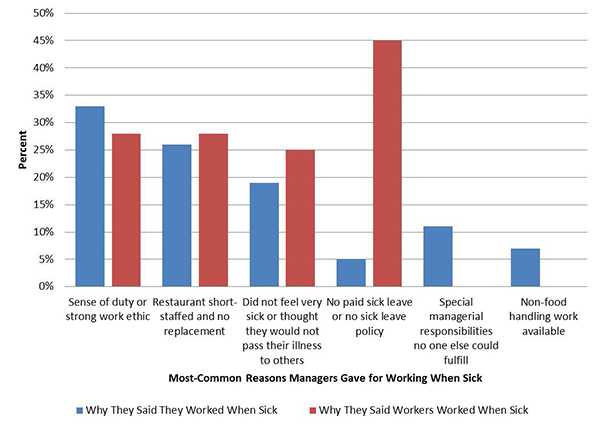Manager Practices about Workers Working When They Are Sick
This page shows the study purpose, method, results, conclusions, and recommendations in plain language for the EHS-Net project titled Ill Food Worker Study.
The findings and recommendations from this project are also in fact sheet format [PDF - 277 KB].
Citations for more EHS-Net publications are available by Study Topic or by Citation.

Study Problem
Sick food workers have been linked with past foodborne illness outbreaks.
The U.S. Food and Drug Administration (FDA) recommends that restaurant food workers not work when sick with symptoms of foodborne illness. FDA also makes recommendations about symptoms that should keep workers from working. Those symptoms include vomiting and diarrhea and other symptoms.
We don’t know how many restaurants have policies about these issues. We also don’t know much about what happens in restaurants when managers and workers are sick. If we learn more about what happens when staff are sick, we can make recommendations to stop them from working when sick. Lowering the number of staff who work when they are sick can reduce the number of foodborne illness outbreaks.
Study Purpose
The purpose of this study was to describe
- restaurant policies for sick workers,
- what happens when managers work when sick, and
- what happens when workers work when sick.
Study Findings in Brief
Most restaurants have ill worker policies, but many of them are incomplete.
Some managers and workers have worked with symptoms consistent with foodborne illness.
Most managers did not ask sick workers if they had foodborne illness symptoms. And in most cases, workers make their own decisions to work when sick.
Managers and workers work when sick for many reasons. They include personal, financial, and social reasons.
Study Method
State or local environmental health specialists interviewed 426 kitchen managers. Restaurants were randomly chosen from the 2008 EHS-Net sites.
We asked managers about
- their restaurant’s policies about sick workers,
- the last time they worked when sick, and
- the last time a food worker worked when sick.
Study Results
Restaurant policies about sick workers
Most restaurants met some of the FDA guidance:
- Almost three-quarters of restaurants have a sick worker policy.
- Almost all of the policies require workers to tell managers when they are sick.
However, many policies did not meet other FDA guidance:
- One in three policies did not list which symptoms should lead to sick workers being kept from working.
- Most policies did not mention jaundice or sore throat and fever as symptoms that keep a worker from working.
Managers working sick
Almost 70% of managers could remember a time they had worked when sick. Figure 1 shows the most-common reasons managers said they worked when sick.
- One in 10 said they had nausea or symptoms of “stomach flu.” These are symptoms of foodborne illness.
- Some managers took steps while at work to keep others from getting sick.
- Over half did not handle food.
- 16% washed their hands more often than when they were not sick.
- About one in 10 wore gloves or masks.
Less than a third of the managers said they asked sick workers if they had vomiting or diarrhea.

Workers working sick
More than 60% of managers could remember a time a worker had worked when sick. Figure 1 shows the most-common reasons managers said they thought workers worked when sick.
Managers said
- About one in 10 workers had nausea or “stomach flu.”
- Some workers took steps while at work to keep others from getting sick.
- One in 5 did not handle food.
- About one in 100 wore gloves or masks.
- About 80% of workers made the decision themselves to work when sick.
Study Conclusions
Although most restaurants have ill worker policies, many of them are inadequate.
Some managers and workers have worked with symptoms consistent with foodborne illness. Managers are more likely than workers to take steps to keep others from getting sick. Such steps include washing their hands more often and not working with food.
Most managers did not ask sick workers if they had foodborne illness symptoms. And in most cases, workers make their own decisions to work when sick. This does not follow FDA guidance that managers should base decisions on whether sick workers should work on workers’ symptoms.
Managers and workers work when sick for many reasons. They include personal, financial, and social reasons.
EHS-Net Recommends
Future prevention efforts should focus on addressing the sick worker policy and practice shortcomings found in this study.
Restaurants should be encouraged to
- Include information in their policies about which symptoms should lead to workers being kept from working.
- Address managers’ and workers’ reasons for working when sick.
Managers should be encouraged to take a more proactive role in deciding whether sick workers should work.
Managers and workers should be encouraged to not work when sick with foodborne illness symptoms.
Key Terms
- Environmental health specialists: public health workers who enforce health and safety standards related to food and other consumer products.
- Foodborne illness: an illness caused by germs in food.
- Foodborne illness outbreak: when two or more people have the same sickness after eating food from the same place.
- Page last reviewed: January 7, 2015
- Page last updated: August 15, 2016
- Content source:


 ShareCompartir
ShareCompartir